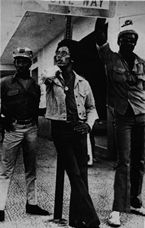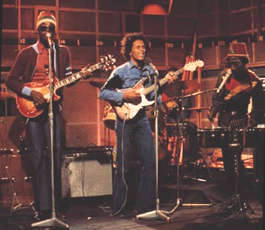In 1969, Marley hooked up with the Barrett Brothers. Drummer Carly Barrett and basist Aston "Family Man" Barrett were the mainstays of producer Lee Perry's studio band, the Upsetters (the two brothers also had their own little group on the sise called the Hippy Boys). As Family Man puts it: "The Wailers was the best vocal group anywhere in Jamaica, and I group (The Upsetters) was the best little backing band, so we seh, "Why don't we come together and mosh up the world!" With the Barretts, undeniably the best bottom in Reggae music, the modern Wailers began to take form with Marley writing, singing, and playing chicken- scratch rhytmn guitar, Tosh playing lead uitar,Tosh playing lead guitar, and Bunny Livingston harmonising and playing hanmd drums. With producer Lee Perry the WaIilers recorded what think are their best songs, and Bob Marley began to receive attention as a lyricist of imposing passion and dark power. Marley's was incantory. defiantly rebellious words to the sweetest and most lilting melodies. Thus the old Wailers' loveliest song, "Trench Town Rock," celebrated a brutal 1967 street riot in Kingston. A favorite Marley lyric preoccupation was hungry children and crying mothers. And the sublime song "Small Ax" warned the colonial world at large: If you are the big tree
Marley wasn't the only writer among the Wailers. His obsession with the creulties os slavery was shared by Peter Tosh, who wroite the brimstone text of "400 Years" as well as the last verse of "Get Up Stand Up", which in time would become the Wailers clarion call. Asked to pose for pictures for their British record company in 1970, the Wailers were posed and snapped skulking around a suburban yard in Black Power berets, clutching toy submachine guns and automatic pistols.
Click image for video link The Wailers in their prime were the best of the part-singing reggae vocal trios. Marley's voice was broard-reaching in its possibilities, evoking both sentimental nostalgia and bitter rage, often in the same song. Bunny's harmony was essentially angelkic and ethereal, while Tosh's low voice implied a deep morality. The old Wailers were morally authoritative in both tone and style. They were the first of the really strong Jamaican groups to adopt the abstemious, continually testifying life of the Rastafarian, incorporating elements of Rasta drummin g into their music long before it became fashionable for reggae groups to do so. After recording with Lee Perry, the Wailers came upon another of the fallow periods that plagued their career. Marley, who like most reggae masters would sign anything for a copuple of hundered dollars in those days, signed a songwriting and publishing contract with Johnny Nash, who had picked up on reggae as the vehicle for his creative rebirth. > | 1 | 2 | |

